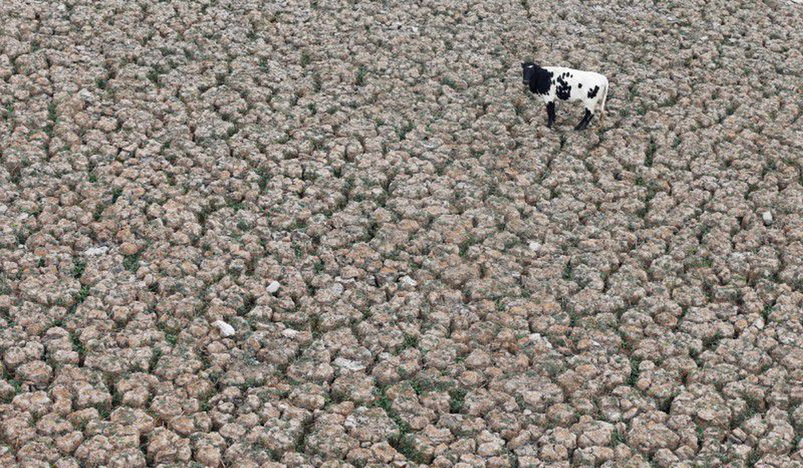
A cow is seen on a land that used to be filled with water, at the Aculeo Lagoon in Paine, Chile January 9, 2019. REUTERS/Rodrigo Garrido
REUTERS
A punishing, decade-long drought in Chile has gone from bad to worse due to a scorching July, a month which typically brings midwinter weather showering the capital Santiago in rain and snow.
But a lack of precipitation this year has left the towering and typically snowcapped Andes above the city mostly bare, reservoir levels low and farm fields parched. The scenes, government officials say, are clear evidence of global warming.
On Tuesday, a central Santiago weather station had recorded just 78 mm (3 inches) of rainfall so far this year compared to last year's 180 mm and an average amount of 252 mm, according to Chile's Meteorological Service.
Science Minister Andres Couve told Reuters on Tuesday that the steady decline in water reserves due to climate change was now a "national priority."
He added the government was addressing the crisis by investing in water conservation and storage, creating a post for a subsecretary of water and establishing a scientist working group on water management, as well as a climate change observatory.
"We already have overwhelming evidence and it is climatic evidence," he said. "We are seeing a very significant decrease in rainfall and that is generating water shortages."
On Monday, United Nations climate scientists warned that extreme heat waves, which not long ago struck once every 50 years, are now to be expected once per decade.
Droughts and downpours are also becoming more frequent, the Intergovernmental Panel on Climate Change (IPCC) report said, and humans are "unequivocally" to blame through greenhouse gas emissions.
Couve said Chile, a long thin nation with the world's driest deserts at its north, glaciers, forests and wetlands throughout and the Antarctic at its south, had bountiful proof of climate change in action.
"The scientific evidence is there but also the weather events are happening with a frequency and intensity that makes it very easy for people to see," he said.
'DAY ZERO'
Some scientists and politicians in Chile are warning of growing, and potentially irreversible, water shortages in the central region whose Mediterranean climate has made it home to vineyards and farms, as well as a third of its population in Santiago, the country's economic engine.
Two rivers that provide Santiago with water - the Mapocho and the Maipo - are drier than they were in 2019, the driest year in Chile's history, Public Works Minister Alfredo Moreno said, prompting regulators to clamp down on water use and seek alternative sources.
Chile's utilities companies have invested heavily in new infrastructure to avoid the arrival of "Day Zero," - the day the taps run dry, a threat which prompted major water restrictions in Cape Town, South Africa, and Chennai, India, in recent years.
That day however "arrived almost a decade ago for nearly 400 thousand people who inhabit rural areas of Chile and today receive water in tanker trucks," said Raul Cordero, University of Santiago climatologist and leader of its Antarctic Investigation Group.
Cordero said the situation faced by rural communities in central Chile is likely to spread and worsen over time.
"It is unlikely the precipitation we once had in the central region in the 1980s and 1990s (will) return, or that we recover that climate," he said.
Chile must build more reservoirs and desalination plants, which are increasingly relied on by its critical mining sector, he added.
"Our only advantage is we now know how climate change will hit us hardest, so we know what we need to do to face the consequences," he said.
Reporting by Reuters TV, writing by Dave Sherwood and Aislinn Laing; Editing by Aurora Ellis
.jpg)
Qatar Secures Place Among the World's Top 10 Wealthiest Nations
.jpg)
Hamad International Airport Witnesses Record Increase in Passenger Traffic

Saudi Arabia: Any visa holder can now perform Umrah

What are Qatar's Labour Laws on Annual Leave?
Leave a comment